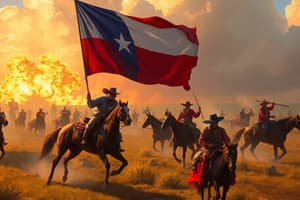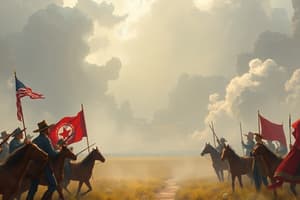Podcast
Questions and Answers
The massive territorial gain brought numerous economic opportunities and increased land resources to the ______.
The massive territorial gain brought numerous economic opportunities and increased land resources to the ______.
U.S.
The treaty promised compensation for Mexican citizens for losses and protections for their ______ rights.
The treaty promised compensation for Mexican citizens for losses and protections for their ______ rights.
property
The war left a lasting impact on both countries, establishing power ______ and shaping political dynamics.
The war left a lasting impact on both countries, establishing power ______ and shaping political dynamics.
imbalances
The acquisition of vast territories from Mexico heightened debates over ______, influencing national politics.
The acquisition of vast territories from Mexico heightened debates over ______, influencing national politics.
The war exposed deep divisions within American society over ______, morality, and the role of government.
The war exposed deep divisions within American society over ______, morality, and the role of government.
Mexico considered Texas a breakaway province and refused to recognize the Republic of Texas's ______.
Mexico considered Texas a breakaway province and refused to recognize the Republic of Texas's ______.
Proponents of expansionism argued for ______, the belief that the U.S. was destined to expand across the continent.
Proponents of expansionism argued for ______, the belief that the U.S. was destined to expand across the continent.
The Treaty of ______ Hidalgo officially ended the Mexican-American War in 1848.
The Treaty of ______ Hidalgo officially ended the Mexican-American War in 1848.
General ______ Scott's campaign through Veracruz and Mexico City was pivotal in the war.
General ______ Scott's campaign through Veracruz and Mexico City was pivotal in the war.
The resulting skirmish between U.S. and Mexican troops near the ______ was often cited as the immediate cause of the war.
The resulting skirmish between U.S. and Mexican troops near the ______ was often cited as the immediate cause of the war.
Flashcards
Texas Annexation Dispute
Texas Annexation Dispute
Dispute over the Texas annexation led to tensions between the U.S. and Mexico, with Mexico refusing to recognize the Republic of Texas's independence.
Manifest Destiny
Manifest Destiny
The belief that the U.S. had a destiny to expand across the North American continent, fueling expansionist desires.
Border Disagreements
Border Disagreements
The U.S. claimed the Rio Grande as the boundary of Texas, while Mexico insisted on the Nueces River, creating a disagreement that sparked conflict.
Economic Interests
Economic Interests
Signup and view all the flashcards
Treaty of Guadalupe Hidalgo
Treaty of Guadalupe Hidalgo
Signup and view all the flashcards
What was the main territorial outcome of the Mexican-American War?
What was the main territorial outcome of the Mexican-American War?
Signup and view all the flashcards
How did the Mexican-American War officially end?
How did the Mexican-American War officially end?
Signup and view all the flashcards
How did the acquisition of new territories affect the slavery debate in the US?
How did the acquisition of new territories affect the slavery debate in the US?
Signup and view all the flashcards
What were some of the social and political divisions exacerbated by the Mexican-American War?
What were some of the social and political divisions exacerbated by the Mexican-American War?
Signup and view all the flashcards
What was the long-term impact of the Mexican-American War on US-Mexico relations?
What was the long-term impact of the Mexican-American War on US-Mexico relations?
Signup and view all the flashcards
Study Notes
Causes of the Mexican-American War
- Disputes over Texas annexation fueled tensions. Mexico considered Texas a breakaway province and refused to recognize the Republic of Texas's independence.
- U.S. expansionist desires played a significant role, proponents argued for manifest destiny—the belief that the U.S. was destined to expand across the continent.
- Border disagreements existed, the U.S. claimed the Rio Grande as the boundary and Mexico asserted the Nueces River as the true border.
- Economic interests, including the desire to control California's resources and trade routes, directly influenced the conflict.
Key Events of the War
- President Polk ordered General Zachary Taylor to move troops to the disputed territory near the Rio Grande.
- The resulting skirmish between U.S. and Mexican troops, was used to garner support for the U.S. declaration of war.
- Key battles included the Battle of Palo Alto and the Battle of Resaca de la Palma, early U.S. victories that bolstered morale and public opinion.
- General Taylor's victories in Texas and northern Mexico, such as Monterrey, continued American successes.
- General Winfield Scott's campaign through Veracruz and Mexico City, culminating in the capture of Mexico City, was pivotal.
- The Treaty of Guadalupe Hidalgo, signed in 1848, ended the war and ceded significant Mexican territory to the U.S. , including modern California, Nevada, Utah, Arizona, New Mexico, and parts of Colorado, Wyoming, and Oklahoma.
Key Figures
- President James K. Polk was a strong proponent of expansionism and crucial in initiating and pursuing the war.
- General Zachary Taylor, prominent in the war's early stages, won key battles in the northern theater.
- General Winfield Scott spearheaded the successful campaign to capture Mexico City.
- Mexican General Antonio López de Santa Anna, despite initial successes, ultimately lost to American forces.
Territorial Acquisitions and Treaty of Guadalupe Hidalgo
- The Treaty of Guadalupe Hidalgo drastically altered North America's geography. Mexico ceded over 500,000 square miles of territory to the U.S.
- This expansion brought economic opportunities and more land, solidifying U.S. control over the Southwest. However, it also caused significant displacement and cultural disruption for indigenous populations.
- The treaty included compensation for Mexican citizens for losses and protections for their property rights, though these promises were not always fully honored, creating ongoing conflicts.
Aftermath and Legacy
- The war created power imbalances between the U.S. and Mexico
- Acquisition of Mexican territories heightened the debate over slavery, with the question of free or slave status for these new lands becoming a major political issue.
- The war exposed deep divisions within American society regarding expansionism, moral implications, and the role of the federal government.
Studying That Suits You
Use AI to generate personalized quizzes and flashcards to suit your learning preferences.




